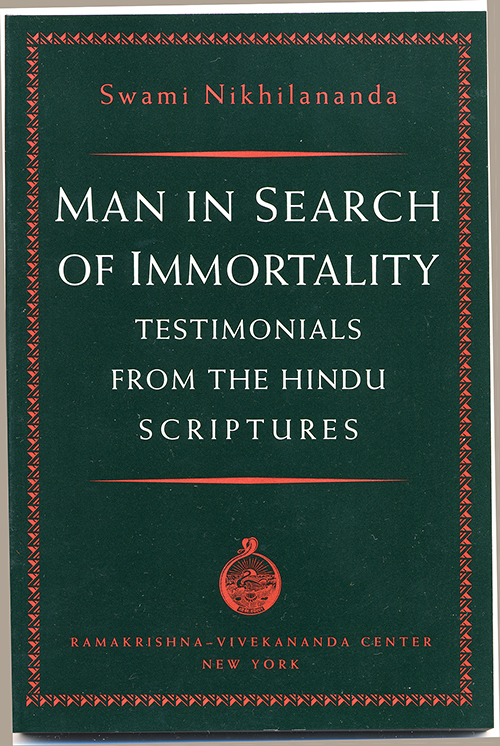
Man in Search of Immortality: Testimonials from the Hindu Scriptures
Swami Nikhilananda. A concise and understandable exposition on man's true nature, his origin, and his ultimate destiny. The sacred texts of Hinduism are used to explain the immortality of the soul and the oneness of humanity. This book will inspire all who wish to resolve the conflict between faith and reason, promote respect among different faiths, and establish religion as a vital factor in human progress.
Paperback: $10.50
Excerpt
Excerpt from the chapter "Three States of the Soul". The Vedantist defines Reality as what remains immutable during the three states of waking, dream, and deep sleep. It is Pure Consciousness. That which did not exist before and will not exist after, but is perceived to exist at the present on account of the peculiar condition of the mind, is termed unreal. There is the instance of the mirage, or the illusory snake. This is true also for all waking and dream experiences. Waking, like dream, is unreal since the objects perceived in the waking state, just like those perceived in dream, have their origin solely in the mind. Whatever object is perceived to exist outside the perceiver, whether in dream or waking, is unreal on account of its being perceived. Any experiences based on subject-object relationship is essentially unreal. As a fish swims between two banks of a river without touching them, so also the Atman (the individual soul) moves between two states of waking and dreaming; from waking it is affected by nothing that it sees in the two states, for nothing cleaves to Atman. The water of the mirage does not wet a single grain of the desert sand.
The story is told of a farmer who heard, while working in his field, that his only son had suddenly fallen ill. He wanted to finish his work before returning home, but then he received the report that the boy was dying. On coming home after finishing his work, he found that the boy had already died and that his wife was bitterly weeping. In a serious mood he sat beside the dead body, but did not shed a tear, and when reprimanded by his wife, told her that during the previous night he had had a very vivid dream in which he saw that he was the emperor of a vast kingdom and she his empress. They had been blessed with seven sons, all versed in the noble arts. But when he woke up the vision disappeared. Now he was wondering whether he should grieve for those seven sons in the dream or for this one son.
The dreamer passes into profound sleep, and in that state the Atman is known by the technical name of Prajna. "When a man, being thus asleep, sees no dream whatsoever, he becomes one with prana alone. Then into prana enters speech with all names, the eye with all forms, the ear with all sounds, and the mind with all thought." "Just as a hawk or eagle, after it has circled around in space, bends its wings, wearied, and glides down to the ground, so the Spirit drops down to that state in sleep in which it no longer experiences desires nor sees any image of dream." "In deep sleep the soul is united with Consciousness, that is, Brahman. There, there are no longer any contrasting objects; there is no longer any empirical consciousness, as in dream or waking." "That is Its real form, in which It is exalted beyond desire, free from evil and fearless. For just as a man embraced by a beloved wife has no consciousness inner or outer, so also the Spirit embraced by the Self, consisting of Knowledge, has no consciousness of the outer or the inner. That is Its real form in which desire has been laid to rest. Then the father is no longer father, mother is no longer mother, the worlds are no longer worlds, the gods no longer gods." All contrasts are lost in the eternal One. "Then the soul is unaffected by good and unaffected by evil, then It has overcome all the pangs of Its heart. If It then sees not, yet It is seeing, though It sees not; for, because It is imperishable, the seeing of the One is not interrupted. There is, moreover, no second beside It, nothing distinct from It to be seen." There is in deep sleep a union with the eternal Knowing Subject, that is to say, Brahman. "Every day one attains Brahman (during deep sleep)." But this union is only apparent and not like the true union that follows the knowledge of Brahman. The sleeper, still under the influence of maya, returns to the consciousness of the waking world, and again becomes his old self - the thief, a thief; the murderer, a murderer; the saint, a saint. In dreamless sleep the Atman remains covered with a thin layer of the veiling power of maya. That is why It is oblivious of the world. The Consciousness inherent in Atman, however, is never destroyed; for this Consciousness is immortal. It appears, therefore, that in the relative world the nearest approach to the experience of Unitive Knowledge, and to peace, is the experience of deep sleep, which is called the causal body with which the sleeper is identified.



